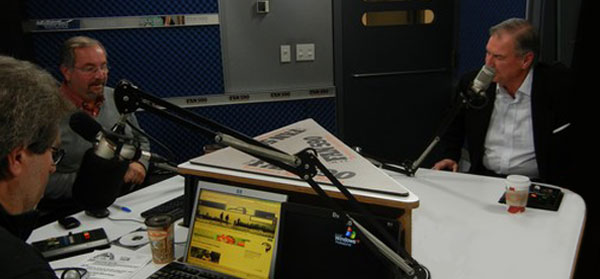
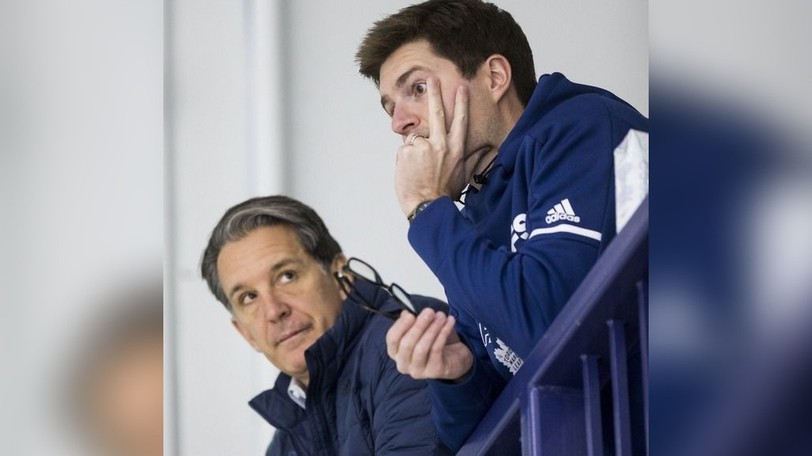
Every story, including the culmination of Kyle Dubas’s tenure in Toronto, encapsulates three perspectives. The spectacle and drama we witnessed over the previous week is something that the worlds of sports and theater may never recreate. The disintegration of a career following another disappointing season isn’t a novel occurrence. However, the rapid descent, the step-by-step disclosure by Brendan Shanahan, and the subsequent diverse media coverage present an unprecedented scenario. It’s improbable that we will ever encounter anything similar again.
I have, through numerous Twitter posts, been consistent in addressing Dubas’s contract situation. While acknowledging the Toronto GM’s tenure was not flawless, I didn’t see the wisdom in parting ways with him unless a demonstrably superior candidate was available. I believe Dubas has matured in his role, learned from his mistakes, and strived relentlessly to transform the Maple Leafs into a championship team. Given the known pool of potential successors, I failed to identify anyone who would indisputably outperform him. Despite my diminished enthusiasm for the lone playoff series victory this season, considering the team’s performance in that series compared to others, I continued to believe that Dubas had merited the chance to receive a new contract.
That brought us to the morning of Maple Leaf locker clean-out day. Upon waking up on that faithful Monday morning in Seattle, I was surprised to find that only one player had completed their end-of-season media session. What usually is a succinct couple of hours appeared to be dragging on interminably. Reflecting back, when Auston Matthews hinted at uncertainty and Ryan O’Reilly essentially declared his intent to pursue free agency, we should have sensed the turmoil brewing within the Maple Leafs organization. However, the turning point was an emotionally charged address by Kyle Dubas, which forever altered the destinies of Dubas, Shanahan, the Maple Leafs, and numerous others within MLSE.
 “It’s been a very taxing year on them. And that’s obviously very important to me. My family is a hugely important part of what I do. So, for me to commit to anything without having a fuller understanding of what this year took on them, it’s probably unfair for me to answer where I’m at. I wish I could give you more. But we haven’t been able to have those full discussions yet. But it was a very hard year on them. I definitely don’t have it in me to go anywhere else. So, it’ll either be here, or it’ll be taking time to recalibrate, reflect on the seasons here. But you won’t see me next week pop up elsewhere. I can’t put them through that after this year.”
“It’s been a very taxing year on them. And that’s obviously very important to me. My family is a hugely important part of what I do. So, for me to commit to anything without having a fuller understanding of what this year took on them, it’s probably unfair for me to answer where I’m at. I wish I could give you more. But we haven’t been able to have those full discussions yet. But it was a very hard year on them. I definitely don’t have it in me to go anywhere else. So, it’ll either be here, or it’ll be taking time to recalibrate, reflect on the seasons here. But you won’t see me next week pop up elsewhere. I can’t put them through that after this year.”
With that, things really got interesting. With so much at stake for the hockey team and so many deadlines approaching time continued to elapse. Despite so many connected insiders, not a single one had any details as to what was going on between Dubas and Shanahan. Very few details emerged between Monday and Thursday with few saying anything other than how critical it was that a decision be made soon while trying to guess when a decision would be made. Nick Kypreos had some details on Thursday which followed an article he had written earlier this season about how a MLSE contract extension ruffled Kyle’s feathers.
Then on Friday, the explosion, or the implosion, occurred.
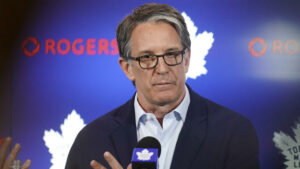 A couple of caveats. One, we can all agree that in this digital age, everyone is aware of their own analytics. Who clicks on what, how many downloads, etc. At the same time, there is no doubt the two biggest drivers of content are either negativity or stories of winning. Finally, I will say again, whenever you read, watch, or listen to anyone ask the questions, where would they come to that information and/or why would they report that? There is no question that on this story bias has become very apparent.
A couple of caveats. One, we can all agree that in this digital age, everyone is aware of their own analytics. Who clicks on what, how many downloads, etc. At the same time, there is no doubt the two biggest drivers of content are either negativity or stories of winning. Finally, I will say again, whenever you read, watch, or listen to anyone ask the questions, where would they come to that information and/or why would they report that? There is no question that on this story bias has become very apparent.
The reactions from the media were as astonishing as the events themselves. From the onset to the present day, it’s apparent that the media reporting this story are in stark disagreement. It’s challenging to pen these thoughts, but as a media observer, it’s become evident that, after a significant period, some appear to have taken positions on the unfolding circumstances. In the week following the GM’s dismissal, fragments of information have emerged, and based on their content, it’s easy to discern whether the source leans towards Dubas or Shanahan. Some media types have been vocal about their belief that without Dubas, the Maple Leafs are facing imminent catastrophe. In contrast, others take a divergent stance, firmly believing that Dubas’s termination was justified solely based on his performance.
I had started to list some of the coverage below, however, it is too much and it keeps coming. Based on lots of listening, and no joke, if there’s been a podcast on the topic over the last week I’ve listened to it. If a talking head has been interviewed on the radio or on TV I have watched. Separately, I have had my own discussions with what I will call people in the know and those with expertise on how these things work inside corporate environments like MLSE.
So, here is my own account for your own entertainment.
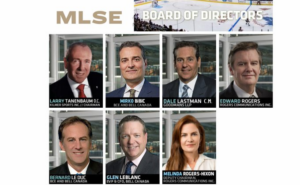 First, I believe that the decision not to extend Dubas last spring was not made by Shanahan. In fact, I believe that if the decision were solely left up to Shanahan, or even Shanahan and Larry Tanenbaum, the extension would have been granted. Regardless of what was said either publicly or privately, I think the lack of an extension played a role in the deterioration of the relationship between Shanahan and Dubas. In part, I am led to believe that Dubas felt that he needed to be able to show his ability to act (successfully) on his own in order to get what he wanted from the board.
First, I believe that the decision not to extend Dubas last spring was not made by Shanahan. In fact, I believe that if the decision were solely left up to Shanahan, or even Shanahan and Larry Tanenbaum, the extension would have been granted. Regardless of what was said either publicly or privately, I think the lack of an extension played a role in the deterioration of the relationship between Shanahan and Dubas. In part, I am led to believe that Dubas felt that he needed to be able to show his ability to act (successfully) on his own in order to get what he wanted from the board.
As time went on, I do believe that two things occurred. One, for reasons not entirely clear, Shanahan took a less active role in the Maple Leafs hockey team than he had in the past and secondly, I think Shanahan and Tanenbaum worked to convince the other board members to extend Dubas. I believe the fruit of this work culminated with Shanahan approaching Dubas after the deadline with the concept of an extension. I think that the reason this was not quickly accepted was (i) the aforementioned ruffled feathers of not getting the extension; (ii) the frustration of the effects of not having Shanahan around while still relying on him to get approval from the board and (ii) the belief that other opportunities like Pittsburgh would exist for Dubas at the conclusion of the season especially if the Leafs were as successful as he believed they would be.
The frustrations in the approval process with the board were real and raised by Dubas throughout the season. I am told by several sources that the fact that there was a process wasn’t the problem, but rather the timing was what frustrated Dubas. An example given was that Dubas would work on something, and would get it to a point where he would need approval. He would then need to get Shanahan up to speed so he could get approval from the board (and to be clear we are talking about significant moves only) and that approval would take up to 3 days to come back. In that time, as you can imagine the opportunity may well have passed. Dubas wanted to pursue big name, high-end defencemen and I am told that this process specifically precluded him from doing so.
While I do not believe a deal was done, Dubas’s agent Chris Armstrong and Shanahan did work on the parameters of a deal. As I tweeted before, I am led to believe that the term was going to be five years (extending beyond the expiration of Shanahan’s current deal) with an annual salary in the $ 4 million range. This would put him in the upper echelon of GMs in the league. While the specifics are varied, I believe that Dubas’s agent was instructed to address the approval process for getting things done in his negotiations. I am led to believe that there was at this point an openness to addressing the approval process.
At the conclusion of the season, Shanahan and Duas re-engaged on the extension and Shanahan urged his GM to not speak with the media until the two had finalized their discussions. Dubas, totally within his rights, decided to meet the media anyways, revealing what he did about the effects of the job on him and his family. While this had been shared with Shanahan privately, I think Shanahan and the board were completely caught off guard that he shared it publicly and that he tied the family component to whether or not he wanted to remain as general manager of the Maple Leafs.
I’m led to believe that when Shanahan and Dubas met on Wednesday, Dubas raised issues with Shanahan that his agent had not raised as part of the previous extension discussion. For the sake of clarity, the best way they have been described to me broadly as job satisfaction issues. I think that this is what led to Shanahan’s comments about having more questions than answers as a result of this meeting. I’ve been told that the combination of Dubas’s press conference, questioning his desire to remain the GM, plus the tone and tenure of the meeting raised more doubt with the Bell and Rogers board members than anyone else.
When the agent called Shanahan and told him that Dubas was indeed all in and shared a new financial structure I am told that the ask had gone from the $4m range to $6m over five years. I am not sure if the addition of the use of a private jet was originally part of the offer or added in later but it was definitely part of the package MLSE offered him and seen as a way to alleviate some of the travel and stress.
I don’t think that this additional ask was in itself the deal killer. I am led to believe that what cemented things was the email from Dubas to Shanahan. My understanding was that this really signified to all on the MLSE side just how badly things had deteriorated between the two that they couldn’t meet and finalize terms or talk things out, and instead, it had to be done either through an intermediary (which was Dubas’s right) or via email.
Ultimately, the perception was that the relationship was irreparably damaged. I am not of the belief that anyone is blaming one side, but that those who were advising were of the belief that it was “too far gone”. Rest assured, I have been told that the board has full faith in Shanahan so you can read into that what we will.
The rest as they say is history. Dubas was confident enough in his own abilities, and the external market that he would find gainful employment away from Toronto under terms that he would demand. I am not certain that anyone on the MLSE really believed that Dubas would either walk away or push them to ultimately make the decision they made.
It’s critical to remember that Shannahan’s own deal has only two years left. While everyone appears to be supportive of him now, one has to wonder if he too will be left twisting in the wind without an extension in his final year as Dubas was too. The board has shown that support and lack thereof can be fluid.
The Maple Leafs are part of a big corporate entity, owned by two bigger corporations. In the end, the demise of Kyle Dubas, was about the deterioration of a relationship and the breakdown of trust between two individuals. This wasn’t about money.
There are some fantastic and interesting “takes” you should listen to, especially on the day of the Shanahan press conference. Notably, they include:
As promised, I had started my usual journal of the coverage, read if you so desire.
Immediately following the presser, The Athletic’s Jonas Siegel and James Mirtle filed a podcast that was quite interesting to listen to. The duo have really grown on me over the years both in written and podcast form. However, this day, Siegel reminded me of that day when Howard Berger screamed into the Fan590 microphone because Pat Quinn didn’t meet the media after an NHL trade deadline day. Siegel was seething on the air going so far as dropping an F-bomb in disbelief at the manner in which Dubas had been dismissed.
You can actually feel the anger as Jonas pounded at his keyboard denouncing the move in his two articles later:
“It left the impression of an organization that willingly walked itself into chaos and tremendous uncertainty at a time when Auston Matthews and William Nylander are both due for extensions, the organization has an Earth-shattering star trade to make, major roster question marks to address, and a new coach to be hired (or not).”
Siegel’s colleague Sean McIndoe (Down Goes Brown) expressed the same feeling of despair in his column:
“It’s that sense that this team doesn’t know what it’s doing. That they’re a never-ending source of drama and not the good kind. That they’re a sideshow. That nobody in charge has a firm hand on the wheel, or any kind of real plan.”
While we had only heard one side of the equation thus far, Mirtle has been speaking with the Dubas friendlies when he wrote his column:
“As reported previously in the aftermath of the Leafs elimination, Shanahan and Dubas had been at odds for a while. On Friday, more details emerged on that front. Multiple sources close to the team said that Shanahan had blocked transactions that Dubas wanted to make at key points in the past several seasons, creating frustration in parts of the management group. Shanahan had also at times dictated certain moves he wanted made that Dubas didn’t agree with.”
In fact, during the Mirtle/Siegel podcast, Mirtle went so far as to say that what had occurred was a clear example of how dysfunctional the Leafs management team had become. When Jonas asked him to explain, Mirtle said that it had been hard to report on the topic during the season when rumours swirled earlier in the playoffs because of a lack of concrete evidence but now that Dubas was gone, he knew that things were dysfunctional.
The impending feeling of doom extends beyond those writing at The Athletic to at least one writer at The Toronto Star, where Bruce Arthur has gone searching for Crazy Glue for the folks remaining at MLSE:
“But what is clear is this organization has cracked.
This year, the relationship between Shanahan and Dubas fractured to a point where they could not negotiate quickly and easily. Whether that was because of the toll on Dubas’s family or a gap in hockey philosophy or simply the pressure of the year, it was clear. Meanwhile, as Pierre LeBrun reported, the well-regarded Jason Spezza, who served as an assistant to Dubas this year, tendered his resignation Friday.”
Dave Feschuk likes the term chaos, too, while also referring to the whole thing as a “bleep show”.
“The jarring thing about the palace intrigue in Leafland this week is that team president Brendan Shanahan couldn’t manage to do either without allowing the affair to be transformed into an embarrassing schmozzle — one that’s thrown the franchise into an untimely state of chaos.
Don’t get it wrong: Friday’s announcement that the Leafs had chosen to part ways with Dubas was the absolutely right choice. Finality was required. The drama needed to end.
But it doesn’t change the fact that Shanahan fired Dubas a day after he was prepared to offer him a generous contract extension. It doesn’t make it OK that the Dubas Debacle has turned the Shanaplan into something closer to a Shana(bleep)show. That will only change if Shanahan’s post-Dubas Plan B — to be rolled out in the coming days as the club undertakes an urgent search for his replacement, atop a list of other pressing business — manages to bring some level-headed clarity to an off-season of uncertainty. Let’s just say the task, with Matthews up for an extension and a slew of key decisions hanging in the balance, will be considerable.”
Kevin McGran also evokes the Harold Ballard ghosts of Maple Leafs past:
“We are now past the ShanaPlan. We’re on to the ShanaSideshow.
“It no longer feels like the Maple Leafs have a plan.
“Kyle Dubas was apparently the plan, right up until he asked for more money and, perhaps more telling, more power. Streamlining how hockey decisions were made.
“The man who was probably getting streamlined out of hockey decisions — president Brendan Shanahan — then decided to “part ways” with the one of the smartest minds in hockey.
“It was Ballardian to its core. It said ‘I’m the boss’. It might have included a few F-bombs. It wasn’t made out of a real rational idea. Shanahan’s feelings were hurt. Perhaps he felt his job was in jeopardy. Let’s remember that Shahanan has never been a scout, or GM or any kind of talent evaluator. But he’s the boss.”
Now, sit down, take a deep breath and let these words sink in…. Damien Cox, the voice of reason:
“The Maple Leafs are not in chaos. Let’s make that clear right off the top.
“Their season ended abruptly in overtime against the Florida Panthers on May 12. Seven days later, general manager Kyle Dubas was turfed, as was the minor-league coaching staff. As well, Jason Spezza resigned from the management team, which would have been more noteworthy if anyone had the vaguest idea what the well-liked Spezza did.
“The NHL draft is still more than five weeks away, starting June 28, and the scouting staff finalized its list of elite prospects long ago. Free agency begins July 1, as does the opportunity for the Leafs to sign star centre Auston Matthews to a contract extension. “My intention is to be here,” Matthews said this past week.
“And by the way, the conference finals only just started.
“So, with apologies to Supertramp: Crisis? What crisis?
Frank Seravali from a podcast:
“In 15-plus years of covering the NHL on a daily full-time basis, I have never seen a press conference like that where someone gets slapped on their way out. To me, it speaks to how it all went down. The tone of what was relayed to the public gives some sort of insight into what happened behind the scenes even though they didn’t spell it out.
“My belief is that this wasn’t a financial leverage play that bothered the Toronto Maple Leafs. Brendan Shanahan makes, I think, $7 million per year. I don’t think that they’re offended by anyone asking for more money.
“What I believe happened behind the scenes is that Kyle Dubas made a push to get Brendan Shanahan out of hockey operations and decision-making. He wanted complete and full autonomy and that this was a power struggle that took place.
“How else do you explain the reaction? Have you ever seen the detail, to that magnitude, laid out in front of you at a press conference? A pure timeline, and even including such things as ‘Kyle sent me an email and said he’d like to stay’. Who sends an email to keep their job?
“Working through all of it, I’ve been saying for months if you listen to me that there’s been friction between Brendan Shanahan and Kyle Dubas. And I’ve seen other reports trying to shit on that reporting and downplay it. It’s just the truth. It’s what’s been happening behind the scenes for months now.
“In fact, I think it goes back all the way to when Shanahan blocked Dubas from getting the Colorado Avalanche job back in 2017. This has been ongoing, it’s been festering, and Kyle Dubas felt like had the goods to make a play for the job, the way he wants to do it with his own autonomy.
“When you come for the boss’s job, you’d better have the goods. And Dubas lost.”
This narrative of too much interference from Maple Leafs ownership in daily operations is pure fiction and pro-Dubas spin. Almost Aanyone who has ever worked a major sports job for board chairman Larry Tanenbaum tells a completely different story.
— Steve Simmons (@simmonssteve) May 22, 2023
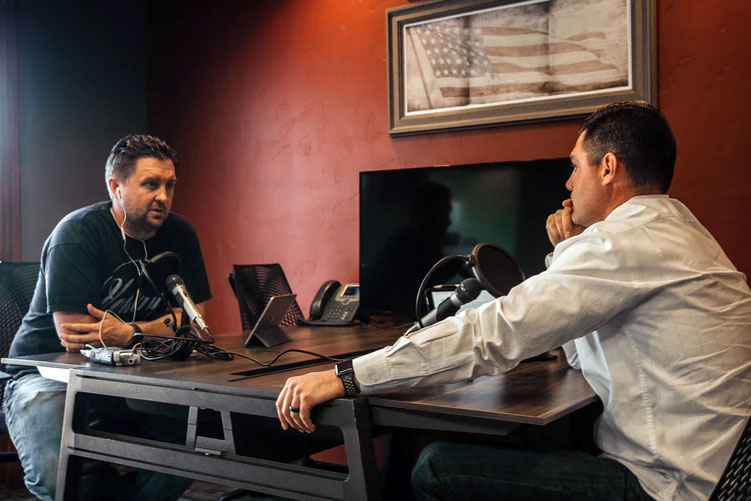
Jonas Siegel’s May 25 article was not his best effort. For example, please take a look at the excerpt below.
“To at least one person who works for the Leafs, this past season felt like the first time when everybody in the organization was pulling in the same direction. It was about their shared mission, of course, of trying to win the Stanley Cup.”
I found these two sentences curious.
First, “to at least one person” is odd phrasing. Was it just one person, and Jonas is guessing there are more people with this view? If it is more than one person, why not say multiple people?
Second, and more importantly, this is the first season “when everybody in the organization was pulling in the same direction”? Who is responsible for everyone not pulling in the same direction? What was going on during the previous four seasons? After multiple first-round exits, the 2022-2023 season is the first time a shared mission has existed.
The reader would be better served if some details/clarity were provided.
The bottom line is that Kyle is gone let’s just move on, I don’t care if Kyle ever works in the NHL again or if he gets a new gig tomorrow he’s not on team Leaf’s that’s all that matter’s. Wouldn’t you know it, Kyle did his best work at the deadline this year and now they get rid of him. I’m more interested in who will be sitting at the helm of the Leaf’s, and will he either get Mathews and Nylander under contract or will he be able to trade them and get a good return. TJ is another player that could be moved being in his last year of his deal why wouldn’t you move him and receive a asset or two. JT either moves down to the third line or left wing. When it comes to the ufa’s I’d try and get Sammy, Scheen, Guss, Accari, signed before free agent frenzy opens. If the Leaf’s GM has to move anyone there’s no better place than the draft, then two day’s later it’s free agency. This organization has Woll, Knies, Robertson, Holmberg, McMann, Steeves, with a couple more just ready to make the jump to the NHL. That’s great because that’s six possibilities to round out your bottom six that’s under 6mil for six player’s. That’s how this next GM can improve this group. Being able to bring in more talented player’s. But the biggest improvement will be replacing the man behind the bench, this group need’s a proven NHL caliber coach. One that can have his player’s ready to start at puck drop, a coach that can put a lineup together without using the blender, a coach that puts his best lineup out,those are just a few thing’s that would make a huge difference in how this group performs. Apparently Sheldon didn’t believe in line chemistry, and that has killed this group for the past four years. Let’s get it right and get the right man for the job and if successful Shanny shouldn’t have any say in what the GM decides, if you’re going to veto what the GM want’s, maybe you should just take the job yourself then. To many cook’s in the kitchen usually ends up spoiling the broth. So stay out of the kitchen Shanny. Cheerz
Good job Jonah, keep up the good qork
The best man for the GMs job is Dale Tallon. Lot what he did in Chicago, and Florida. Give him free reigns and watch this team move forward very quickly. Do not hired that guy from Calgary , if they do they will never move to the next level.
Like Well, lights on, nobody home. The Leafs are now looking for cheap high end players to supplement the “5” highly paid players who had never proved themselves in the NHL so cry me a River. Self inflicted wounds that will haunt the Leafs faithfull oh and Dubas, Leafs management for being blackmailed by the last significant signing Nylander, who however showed he had heart. The others well if other NHL teams trade in to their outrageous contracts, they too should fire the GM. Enough every one has watched the ineptitude of their abilities to score so why pay them.
The man who was probably getting streamlined out of hockey decisions — president Brendan Shanahan — then decided to “part ways” with the one of the smartest minds in hockey.……Dubas has not proven he is one of the smartest mind in hockey in any way, he lucked out with a number pick for Matthews and the Marner/Nylander picks did not need a great hockey mind. The rest of the moves were mostly failures as far as building a playoff team. It’s clear, hot Goalies and clutch scoring win playoffs, he did not find what the team needed.
Dale Talon or Stan Bowman will be an improvement.
Jonah, Thanks for this great article. it really does pull together the full spectrum of events and opinions around the buds and what has happened since their playoff exit. As a retired late boomer who has managed many people and who has had to manage up a lot (without much success I might add!), what has happened with Dubas is in my opinion quite common in business. When you are in senior roles you are expected to be high functioning and what we liked to call a “maintenance free” employee. Any indication otherwise is considered a warning sign, and Shanahan’s reaction and comments are reflective of that in my opinion. It is quite uncommon to to so publicly though. another factor at play is the “Boomer boss – Millennial employee” dynamic, where the Boomer expects the Millennial to be patient and the Millennial wants to move up fast. I’ve seen this a lot in my career. Finally and this is a generalization of course, but i think younger employees are much more comfortable talking about mental health than older folks so Dubas’s declaration may have made Shanahan uncomfortable (see the silent generation for more info on that subject!). So in conclusion, NHL management are people (too) just like us and as a longtime leaf fan I’m OK with what went down, as I think both Dubas and Shanahan are good people and the Leafs need a new direction to succeed in the playoffs.